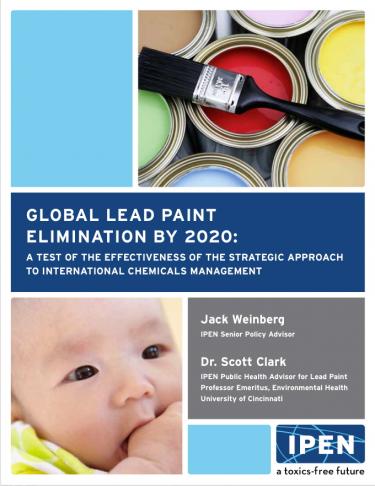IPEN Research
IPEN has demonstrated that leaded paints for home use continue to be widely produced, sold and used in developing countries despite the fact that most highly industrial countries banned leaded house paints more than 40 years ago. IPEN’s global campaign to eliminate leaded paint raises awareness that childhood exposure remains a serious problem and has catalyzed national activity in a number of developing countries to eliminate leaded paint and protect children.
Since 2009, numerous studies have been conducted to assess lead levels in paint. IPEN-affiliated NGOs have conducted the majority of these, collecting and analyzing more than 4,000 paints in 59 countries, and IPEN has assisted NGOs in establishing national lead paint elimination projects and programs. Lead levels in paints in most of these countries were found to be high. Results from all lead paint studies conducted since 2009 can be seen at this map.
IPEN Reports
See the full database of IPEN Country Studies on Lead in Paint.
Lead in Playground Equipment
- Indonesia: Full Report (English), 2019
- Malaysia: Full Report (English), 2019
- Mexico: Full Report (Spanish), 2019
- Philippines: Full Report (English), 2019
- Thailand: Full Report (English), 2019
Lead in Spray Paints
- Philippines: Full Report (English), 2020, Full Report (English) 2022
Lead in Industrial Paints
- Philippines: Full Report (English), 2021
Lead in Solvent-Based Paints for Home Use
- Argentina: Full Report (Spanish), 2017
- Armenia: Full Report (Armenian), 2016/ Summary (English), 2017
- Bangladesh: Full Report (English), 2021
- Belarus: Full Report (Russian), 2016 | Summary (English), 2017
- Cameroon: Full Report (French/English), 2015 | Full Report (French/English), 2017
- China: Full Report (English/Chinese), 2017
- Colombia Full Report (English) 2023
- Colombia: Full Report (Spanish), 2016 | Summary (English), 2017
- Côte d'Ivoire: Full Report (French/English), 2015 | Full Report (French/English), 2017
- Ethiopia: Full Report (English), 2015 | Full Report (English), 2017
- Georgia: Full Report (Russian), 2016 | Summary (English), 2017
- Gambia: Full Report (English), 2018
- Indonesia: Full Report (English/Bahasa Indonesia), 2021
- Iraq: Full Report (Arabic / English), 2018
- Jamaica: Full Report (English), 2018
- Kazakhstan: Full Report (Russian), 2016 | Summary (English), 2017
- Kenya: Full Report (English), 2017
- Korea: Full Report (English), 2019
- Kyrgyzstan: Full Report (Russian), 2016 | Summary (English), 2017
- Malaysia: Full Report (English), 2016
- Mexico: Full Report (Spanish), 2018 | Summary (English), 2019
- Moldova: Full Report (English), 2016 | Summary (English), 2017
- Mongolia: Full Report (English), 2017
- Morocco: Full Report (English), 2017
- Nigeria: Full Report (English), 2017
- Pakistan: Full Report (English), 2017
- Philippines: Full Report (English), 2023; Full Report (English), 2017
- Russia: Full Report (Russian), 2016 | Summary (English), 2017
- Sri Lanka: Full Report (English), 2021
- Taiwan: Full Report (English), 2016
- Tajikistan: Full Report (Russian), 2016 | Summary (English), 2017
- Tanzania: Full Report (English), 2015 | Full Report (English), 2017
- Uganda: Full Report (English), 2017
- Ukraine: Full Report (Russian), 2016 | Summary (Englsh), 2017
- Vietnam: Full Report (English/Vietnamese), 2021 | Full Report (English/Vietnamese), 2016
- Zambia: Full Report (English), 2017
- Global Report (2020)
- Global Report (2017)
- Africa (2017)
Overview of IPEN Analysis of Water-Based Paint
Guidelines for Lead Replacements:
Technical Guidelines for replacing lead oxide in anti-corrosives paints in Tunisia (2018)
Replacement of Lead Pigments in Solvent-Based Decorative Paints (2016)
Lead Drier Replacement in Solvent-Based Alkyd Decorative Paints (2016)
Eliminating Lead in Paint in Seven Asian Countries (2015)
This report tells the story of how seven Asian countries succeeded in reducing lead levels in paint in their countries and highlights the project accomplishments in each country.
Africa Regional Paint Report (2015)
A report from IPEN presenting the results from a study of the lead content of oil-based enamel decorative paints available on the market.
Worldwide Data on Lead in Paint: Published Studies and Reports (2015)
A summary of test sample data of lead in paint in countries around the world.
Asia Regional Paint Report (2014)
A report from IPEN (made possible by funding from the European Union through the Switch Asia programme) presenting the results from a study of the lead content of oil-based enamel decorative paints available on the market in seven Asian countries.
Lead in Enamel Decorative Paints – National Paint Testing Results: A Nine Country Study (2013)
A report from IPEN and UNEP on lead in paint in nine geographically diverse, developing countries.
Asian Lead Paint Elimination Project (2013)
This project includes reports on lead in paint from IPEN participating organizations in seven Asian countries.
Eliminate Lead Paint: Protect Children’s Health (2013)
An introductory guide to the issue of lead paint elimination
Global Lead Paint Elimination by 2020: A test of the effectiveness of the Strategic Approach to International Chemicals Management (2012)
Prepared for the third meeting of the International Conference on Chemicals Management (ICCM) in 2012, this report argues that the global elimination of all decorative paints in all countries of all regions by 2020 is an achievable objective.
Global Study to Determine Lead in New Decorative Paints in 10 Countries (2009)
A report from Toxics Link and IPEN on lead levels in paint in ten developing countries
IPEN Participating Organization Reports
Several IPEN Participating Organizations worked on issues related to lead in paint via IPEN’s International SAICM Implementation Project (ISIP). Please go here to see ISIP reports, and choose “lead” under the keywords menu.
Lead in Kenyan Household Paint (2012)
Lead in Russian Household Paint (2013)
Plomo en las Pinturas Paraguay (Lead in Paraguay Household Paint)  / Executive Summary (English) (2013)
/ Executive Summary (English) (2013)
Debug project variant
Debug project variant







